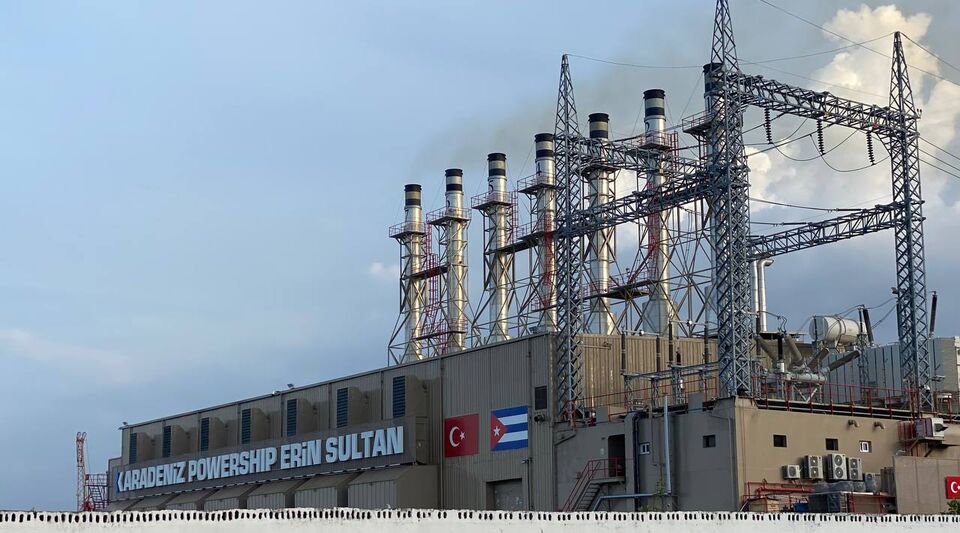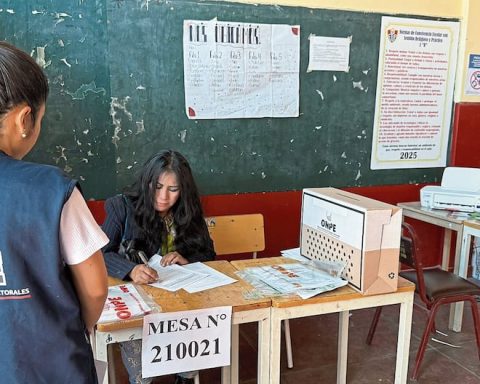The fire in unit 2 of the Lidio Ramón Pérez plant, in Felton (Mayarí), has been “a severe blow” to the Cuban electricity system and recovering it “will not be a quick process, at least more than a year will It will take time to recover that boiler and put the machine into generation,” warned Edier Guzmán Pacheco, technical director of the Cuban Electrical Union (UNE), this Monday on national television.
The technician was together with the Minister of Energy and Mines, Liván Arronte Cruz, head of the most conflictive sector at the moment on the Island, who intervened last night to give explanations to a jaded population in the face of a situation – the one generated by the endless blackouts and power outages. light – which for the official is “complex and tense, but it has a solution, which is not immediate, but gradual”.
Arronte recalled that Felton 2 has a high generating capacity (about 255 MW per hour) that has been lost since the accident that he gave details of last night. The unit, which had undergone maintenance and was due to enter the system in early July, suffered a “fracture in a fuel return pipe from the burners, causing significant damage to one of the four main columns of the boiler “, which ruined the forecasts that the Government had made, since even reserves were lost.
It could have been even worse, the official explained, and the boiler would have collapsed, but the risks remain, as the structure is damaged and could still fall.
Guzmán Pacheco explained that the maintenance to which the unit was undergoing lasted a month longer than expected. When at last, and after several more inconveniences, it was going to come into operation, the boiler was stopped to make a gas change. At that moment, one of the elbows in the pipe failed and the fuel spilled onto the boiler, turned off but still hot, causing a major fire.
Although the firefighters managed to control it in 15 minutes, the intensity of the fire was very high. “The flame hit directly on one of the columns that supports the structure of the entire boiler, which failed moving in the vertical axis more than a meter, causing the movement of all the columns of the boiler.” It could have been even worse, the official explained, and the boiler would have collapsed, but the risks remain, as the structure is damaged and could still fall.
The technician explained that there are parts of the boiler, such as the air heaters or the fans, that are not damaged, but the situation is being assessed to determine its consequences and how long it will take to recover.
More dedicated to the political part, Minister Arronte Cruz reviewed the well known factssuch as the fact that the reserves are non-existent, that the national system operates at less than 40% of its capacity –with an availability of around 2,500 MW of the 6,558 MW installed–, that the plants should have been retired years ago and that the The country must invest large amounts of money in energy because “the blockade” forces the fuel to be brought from further afield, the value of which is not included in the 250 million dollars a year that it costs to maintain the system.
“The last ships that we have been able to acquire are around 64 or 67 million (dollars) and bring about 40,000 tons, which is enough for a maximum of 10 days of consumption in the country. It costs us almost 30% more, because you have to bring it from distant markets,” he said. Last Thursday, a shipment with 700,000 barrels of Russian fuel oil arrived on the island, although this is not the fuel used in power plants. The minister did not mention the free oil that is received from Venezuela for more than 20 years and that, although in diminishing quantities, continues to arrive on the Island.
Electricity generating plants were also discussed at the Round Table, not without mentioning that it was Fidel Castro’s idea to develop this program during the years of the so-called energy revolution. The system, of which its director, Arles Luna Leiva, gave abundant technical details, is made up of 1,334 MW of diesel, of which only 560 are obtained per day (944 groups in 154 plants) and 1,272 MW of fuel, which generate just 300 MW ( 507 groups in 35 plants). 752 units are out of service for various reasons ranging from breakage to lack of maintenance.
“In distributed generation there are no foreign investment projections at the moment,” the official said. To date, Turkey has sent five floating generating plants that are reinforcing the system, but the lack is so great that the problems are not solved with the approximate 15 MW that each of these structures contribute.
Cuban energy officials said last night they were concerned about the long hours without electricity that Cubans spend, although they once again asked the population for savings and sacrifice
Cuban energy officials said last night they were concerned about the long hours without electricity that Cubans spend, although they once again asked the population for savings and sacrifice and insisted that they maintain a policy of constant communication to try to affect life as little as possible. of citizens, even at this time of year when, they said, the weather considerably affects electrical structures, causing more breakdowns than expected.
That was what, they assured, happened in Los Palacios last Thursday, when the planned four or five-hour outage cycle in the municipality was joined by a break as a result of a storm. Users, as reflected in the multiple comments on the electricity deficit news, affirm that the provinces, where the power outages are longer, are being punished in the extreme. That claim was collected in a statement from the Trotskyist group Communists of Cuba, which affirmed this Friday that the restrictions are stifled where the population expressed its least dissatisfaction on 11J, such as in Pinar del Río, where there were no demonstrations.
In the program, the specialists offered a detailed schedule of how maintenance and repair actions will be carried out that should lead to the recovery of energy, but a dialogue between two readers of Cubadebate this Sunday accurately reflected the problem of the country’s energy system and in far fewer words than those used yesterday by officials.
“And what happened to Felton 1 again?” asked one. To which another replied: “The same thing that happens to someone who never goes to the doctor and has a problem. He heals and another one comes out.”
________________________
Collaborate with our work:
The team of 14ymedio is committed to doing serious journalism that reflects the reality of deep Cuba. Thank you for joining us on this long road. We invite you to continue supporting us, but this time becoming a member of our newspaper. Together we can continue transforming journalism in Cuba.


















